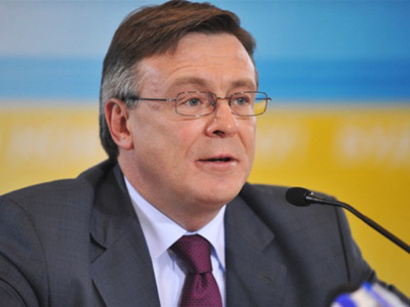OSCE chair Ukraine to be ‘exceptionally active’ on frozen conflicts

By Sara Rajabova
Ukraine has pledged to work hard until the end of its OSCE presidency to facilitate resolution of "frozen conflicts".
"We will be exceptionally active until the end of this year and will participate in the resolution of the so-called 'frozen conflicts'," OSCE Chairperson-in-Office, Ukrainian Foreign Minister Leonid Kozhara said in an interview with Intefax news agency.
"After all, even looking at the map, we can see that Ukraine is surrounded by these conflicts from all sides," he said.
Kozhara noted that his country has a 1,200 km land border with Moldova, and there are also "frozen conflicts" in the three South Caucasus countries to the east of Ukraine.
According to Kozhara, the situation in the South Caucasus is complicated given that there are deep historical and cultural roots for the rise of conflict in this region.
"But as the presiding country of the OSCE we are working quite actively in Georgia, Azerbaijan and Armenia," he said.
Earlier, during his visit to Armenia, Kozhara said the work of the OSCE Minsk Group -- which is brokering a settlement to the Armenia-Azerbaijan Nagorno-Karabakh conflict -- could be more active.
He reminded that the settlement of "frozen conflicts" is one of the priorities of Ukraine's presidency.
The Nagorno-Karabakh conflict emerged in 1988 when Armenia made territorial claims against the neighboring country. Since a lengthy war between the two South Caucasus countries that displaced over a million Azerbaijanis and ended with the signing of a precarious cease-fire in 1994, Armenian armed forces have occupied over 20 percent of Azerbaijan's internationally recognized territory, including the Nagorno-Karabakh region and seven surrounding districts.
Peace talks brokered by Minsk Group co-chairs representing the United States, Russia and France have been largely fruitless so far.
Peace talks are underway on the basis of the peace outline dubbed the Madrid Principles, also known as Basic Principles. The document envisions a return of the territories surrounding Nagorno-Karabakh to Azerbaijani control; determining the final legal status of Nagorno-Karabakh; a corridor linking Armenia to the region; and the right of all internally displaced persons to return home.
